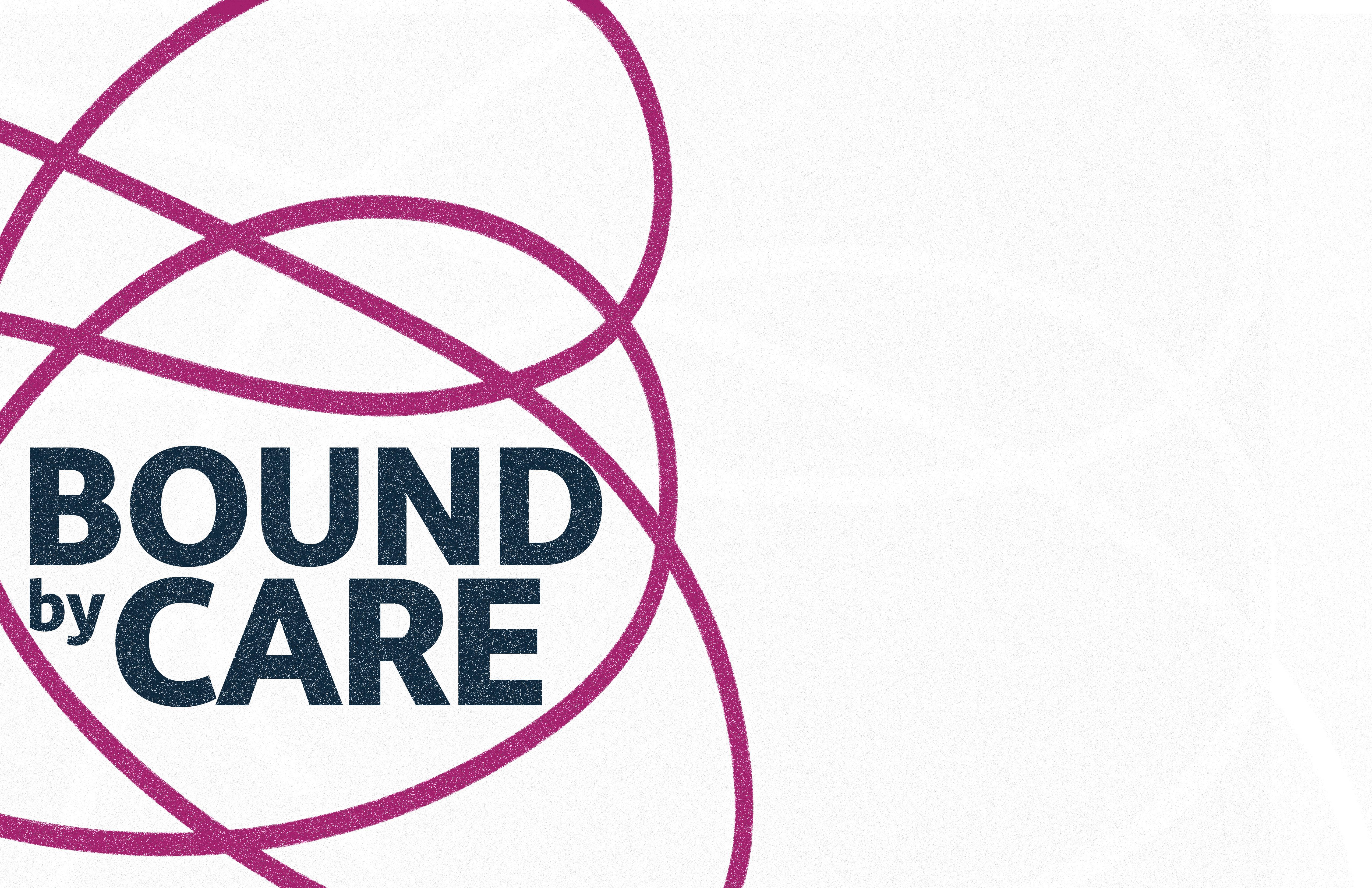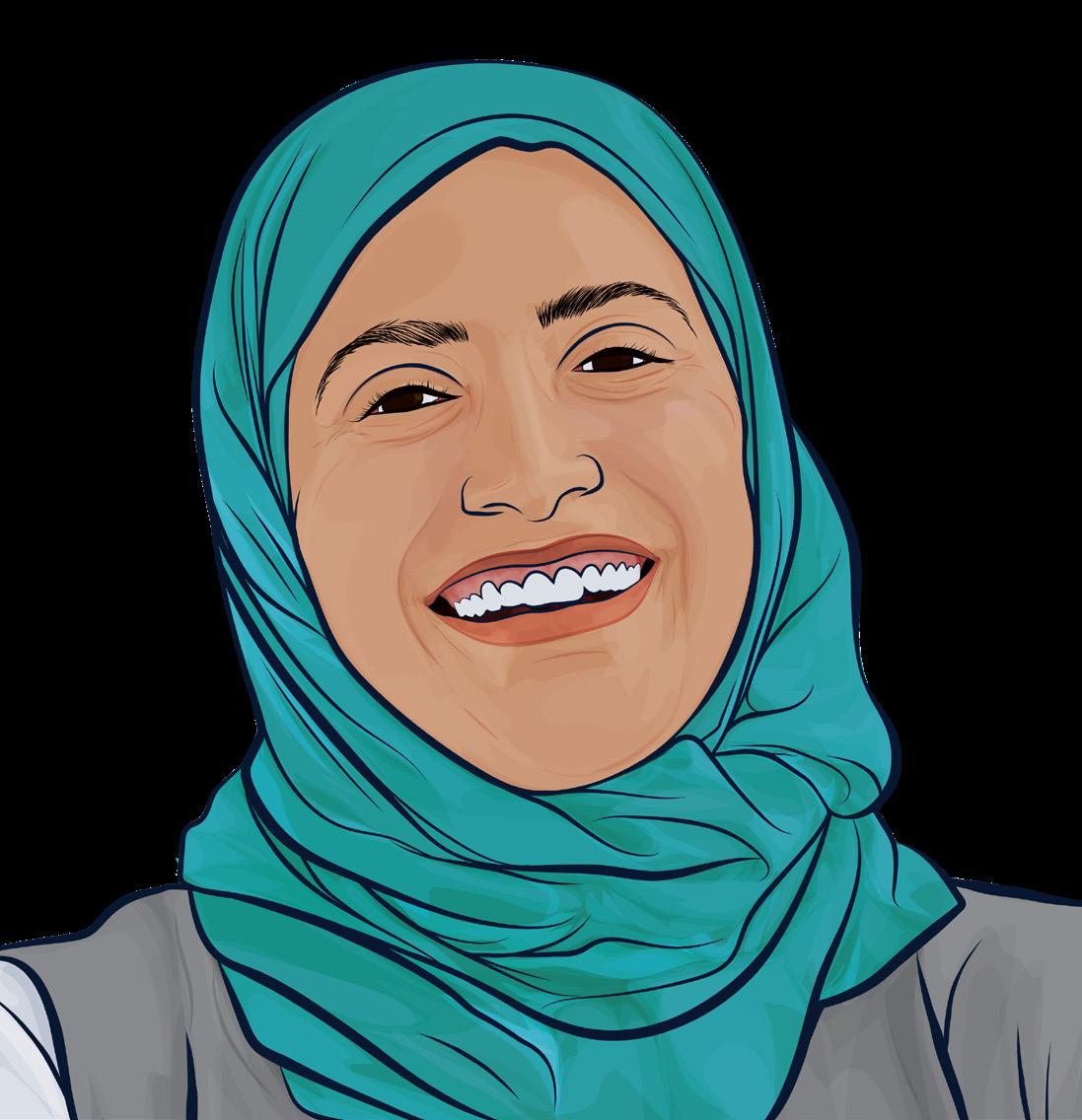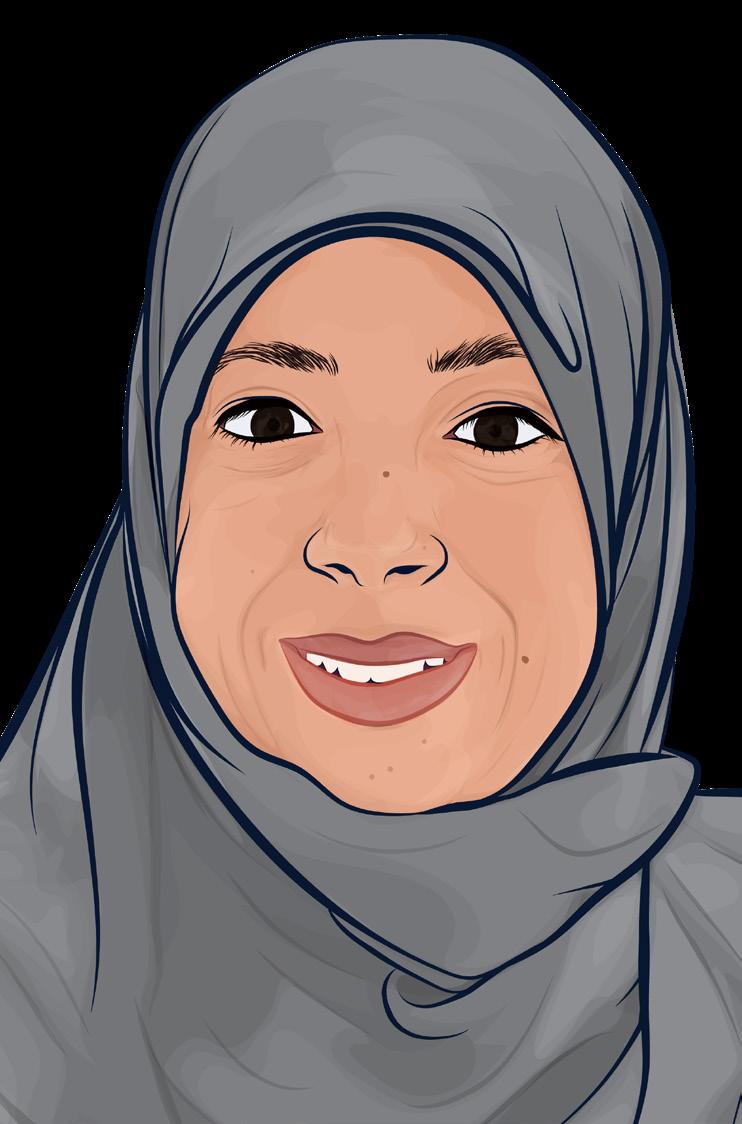In its current state, the U.S. childcare system is unequipped to support mothers reentering the workforce.

Soaring costs, a critical shortage of caregivers, and diminishing federal support have created a challenging environment for families seeking affordable, accessible childcare. Immigrant women in particular face intersecting barriers hindering their integration into the workforce in a new country.
As it stands, women shoulder a disproportionate burden of childcare and household responsibilities. According to the U.S. Census Bureau, mothers are four times more likely than fathers to miss work due to childcare, with women accounting for a substantial 82% of childcarerelated work absences. Meanwhile, many employers fail to provide crucial safeguards such as paid leave, forcing women to scale back their work hours or exit the workforce altogether.
For immigrant, refugee, and asylee women, these challenges are often exacerbated by further barriers in navigating cultural adaptation, financial instability, and the complex immigration system.
In 2022, after launching our Women’s Economic Power (WEP) initiative, Upwardly Global aimed to address the unique barriers that workauthorized immigrant women face at the intersection of their multiple identities, such as gender, color, and immigration status. We quickly found that a lack of childcare was the primary reason that women drop out of our program, stalling their job-search journeys in the U.S.
To deepen our understanding of their experiences, we conducted a series of listening sessions in the fall of 2023,
with participants representing 20 countries of origin across 13 U.S. states. Within the following pages, you will find the lived experiences of immigrant, refugee, and asylee women navigating the U.S. childcare system. These narratives also contain their recommendations to strengthen access to childcare within their communities and across the country.
The conversations revealed shared themes, with many expressing their need to leave the U.S. workforce due to exorbitant childcare costs despite strong desires to remain. They detailed the sacrifices they made in their careers, independence, and financial stability to care for their children, along with the mental health impacts they endured such as increased stress, anxiety, and depression.
2 Upwardly Global Bound by Care
the Childcare Crisis for Immigrant Women
Stories of
Participants also discussed the lack of awareness of cultural practices at childcare centers, including diverse food options and language accessibility. Other issues, including long waiting lists, limited part-time care options, delayed response times, lack of transportation, and constantly changing application and enrollment requirements, were also prominently featured in our discussions. These challenges were particularly significant for job seekers in need of flexible childcare options during their job search process, as they struggle to find part-time care that justifies the cost of full-time childcare.
We intend that the voices, testimonies, and experiences of the immigrant women highlighted in the following pages serve as valuable insights to inform efforts to enhance access to childcare for immigrant, refugee, and asylee families and bolster their economic power.

MARYAM

Age: 31
Country of Origin: Afghanistan
Based in: California
Profession: Professor
Education: Bachelor’s in graphic design and master’s in business administration
Children: 4-year-old daughter and 18-month-old son
Primary childcare concern: Affordability
“Whenever my kids notice that I’m busy, they always need something,” shares Maryam. After a brief pause during this interview to care for her baby, she returns to the Zoom call, adjusting her hijab. Public appearances are rare for her, but they’re a small reprieve from the usual: day-in and day-out childcare.
In a previous life, 31-year-old Maryam had established a
3 Upwardly Global Bound by Care

successful career as a professor in Afghanistan, holding degrees in graphic design and business administration. During that time, a robust support system of family and friends helped manage childcare.
“Even though I was married, I was an independent woman,” she remembers, then able to balance her career and motherhood. Yet, in 2022, Maryam and her family were forced to flee following the Taliban’s resurgence, turning her life upside down.
Now in Southern California, she finds restarting her life and career as a refugee mother in the U.S. to be an even greater challenge.
“You come with lots of dreams — it’s ‘opportunity land,’” Maryam says. “I thought that it would be easy. I have my master's degree; I'm capable of doing anything that I want. But here, the first full stop was the kids.”
Despite efforts to pursue a career, financial instability and a lack of childcare support severely limit her options. While her husband works 10 hours a day as a delivery driver, she remains at home, caring for her 4-year-old daughter and 18-month-old son.
“The childcare problem is preventing me from pursuing my career, my profession, and what I dream of doing in the United States. I envisioned something different for myself, but now, I find myself stuck
at home, only able to take local English classes. That's the extent of what I can do,” says Maryam.
“THE CHILDCARE PROBLEM IS PREVENTING ME FROM PURSUING MY CAREER, MY PROFESSION, AND WHAT I DREAM OF DOING IN THE UNITED STATES."
Although only a half hour away from her sister-in-law, Maryam’s U.S. family have their own jobs and kids to support. Now that her 4-year-old is in school, her main obstacle to pursuing her career lies in the exorbitant cost of daycare for her little one.
“[In Afghanistan,] as someone who worked for the government, I could not pay for private daycares, but the public [daycare] was something that everyone can afford if they are willing to work or study,” Maryam recalls. “It was so much better than the U.S. — I had a job, and I supported my husband.”
“In the U.S., my husband alone cannot afford two kids, rent, utility bills, clothing, and [food],” she says. And yet, she believes that taking a low-salary job and paying for daycare would negate the benefits of working. In California, the average annual cost of childcare for just one toddler was $13,408 in 2023.
4 Upwardly Global Bound by Care

Her options are slim, but Maryam knows that she needs to work both to support her family and to find empowerment in her day-to-day life.
“I don’t like not being busy, so I try my best to keep myself occupied with childcare, cooking, cleaning, and studying, but it's not what I want,” she says.
For now, Maryam has no choice but to wait. Despite starting to work with Upwardly Global to chart a career path and earn a U.S. teaching certificate, she can’t afford to wait until her baby boy is old enough to attend school. If given the opportunity, Maryam’s experience could help address the more than 55,000 teacher vacancies in the U.S. education system.
“When you're new to a country, everything is different, and you have to accept it. However, that doesn't mean you should confine yourself to staying at home,” she says. Her job coach has been a major help, offering more than just career guidance: hope.
Maryam smiles. She says that in the past year, getting her education documents evaluated was the only thing that made her truly happy.
Given the restrictions that Afghan women face in accessing education due to Taliban rule, Maryam's achievements are truly extraordinary. No reliable data exists on the amount of Afghan women with master's degrees, but her educational attainment likely placed her among the
top professionals in Afghanistan.
It seems like she could go on, but her kids tug at her shirt.
“I'M YOUNG AND HAVE THE ENERGY TO WORK, BUT BECAUSE OF CHILDCARE, I CAN'T PURSUE THAT."
“I'm young and have the energy to work, but because of childcare, I can't pursue that. It doesn't mean I don't want my babies; I do. But I also need something for myself.”
5 Upwardly Global Bound by Care
NATALYA

Natalya had always envisioned moving to the U.S. As a child, her father had immigrated there from Ukraine on a lottery visa, and she had a feeling that she would eventually follow suit. However, what she couldn't have foreseen was that by April of 2019, she would find herself stranded there with two small children.
While on her annual visit to family in Chicago, she gave birth to her daughter. Following the birth, doctors delivered heartbreaking news: Her newborn had a rare metabolic disorder that would prevent her from eating “normal” foods with protein for the rest of her life.
“I realized that I needed to stay, which I wasn't prepared for at all — I came here with just my luggage,” she remembers. Her husband had not accompanied her to the U.S., and with both a 3-year-old and a baby with a disability in tow, travel was simply not feasible. She was also uncertain if her baby's special formula would be available back home.

Age: 31
Country of Origin: Ukraine
Based in: Illinois
Profession: Project manager, reskilled as an IT developer
Education: Bachelor’s in applied linguistics and master’s in international business
Children: 8-year-old daughter, 5-year-old daughter, and 3-yearold daughter
Natalya and her husband had initially moved from Ukraine to Poland, where she earned her master’s degree and began building a life and career. Now, with her parents’ U.S. sponsorship, she found herself having to start from scratch once again. This time, alone.
“I was in so much distress — anxiety, depression, a postpartum diagnosis. It was a wave of everything,” she recalls, stuck in her parent’s small apartment with no income.
“With two kids and myself, I needed childcare, but it was so expensive that affording it was out of the question. Particularly for infants, it's very costly,” she says. “Even if I had an income, I wouldn't be able to pay for daycare, and I didn't even have the knowledge — where do I even look for it?”
“Because of this, I couldn't even attempt to find a job, so I ended up living with my parents [and] waiting for my husband to arrive, which took almost half a year.”
By September of 2019, the family reunification process finally
6 Upwardly Global Bound by Care

allowed her to unite with her husband. It then became a matter of finding work, taking care of the kids, and navigating a new life in the U.S.
“I didn't want to start all over,” Natalya adds. “When I had my third child, my daughter, what saved me was that my older child started going to school.”
With one out of three in school and her husband finally employed, she explored the idea of part-time work. Still, she did the math, and her earnings would not cover the expense of daycare for two.
In Illinois, the average annual cost for childcare for two toddlers was nearly $25,000 in 2023 — that’s 74% of the median single mother's income. In the state, 15% of children had their parents change or lose jobs because of problems with childcare.
“I considered it impossible,” she laments. “Typically, [immigrant] mothers face a dilemma: either they work, earn a paycheck, and spend it all on daycare, or they work as a daycare provider themselves.”
But Natalya had over five years of project management experience — these couldn’t be her only options. Guided by an Upwardly Global career coach, she decided to reskill as an IT developer, enrolling in a six-month IT bootcamp program with flexible hours that were crucial for her as a mother.
“I had to study at night, which was challenging. However, the course helped me start my job search and eventually land a job that I really love,” she says.
With Upwardly Global's support, Natalya secured a role as a Product Developer after three years out of the workforce. The job allows her the flexibility to work from home while caring for her children. She feels lucky to be in this position, as the journey often felt insurmountable.
“EVEN IF I HAD AN INCOME, I WOULDN'T BE ABLE TO PAY FOR DAYCARE, AND I DIDN'T EVEN HAVE THE KNOWLEDGE — WHERE DO I EVEN LOOK FOR IT?”
“I felt a lack of confidence because, in society, whether in the United States or Ukraine, being a mom can make you feel like you've missed out on a few years,” she shares. “I appreciate having regained confidence in myself by successfully transitioning to a new career."
Despite her career progress, there are still considerable challenges. Juggling a new career, three children, and adapting to a new cultural landscape has been no easy feat.
“I still don't have childcare for my kids,” she clarifies, as navigating the complicated childcare and school systems in the U.S. has been an absolute whirlwind. She's not alone; the intricacies of the system lead 9 out of 10 children eligible for federal childcare subsidies to miss out on the support they need.
Without clear information from the start, Natalya charted the path almost entirely on her own.
7 Upwardly Global Bound by Care

SARAH

Age: 35
Country of Origin: Libya
Based in: Texas
Profession: Medical professional
Education: Bachelor’s in medicine and general surgery
Children: 8-year-old son, 5-yearold daughter, and 2-year-old daughter
Primary childcare concern: Poor quality of care
Last year, Sara had to turn down the perfect job. It was a clinical research training program at a reputable hospital near her home in Dallas. Although the salary would relieve her financial strain, there were zero childcare-related benefits. Her three kids, who are 8, 5, and 2, would not take care of themselves.
“I wasn't expecting to get that job that soon and [for it] to be that close to my house. Everything was perfect, but the only obstacle was childcare,” Sara says. “That was very hard to let go of — I really think about it all the time.”
Since immigrating to the U.S. from Libya in 2021, she has felt paralyzed with the inability to work in her field. This job would have been the first step toward a career in her new home of Dallas, Texas.
In Libya, Sara had earned the equivalent of a bachelor’s degree in medicine and general surgery. For a few years, she worked in the general pediatric ward at Tripoli University before transitioning to clinical research in microbiology and parasitology.
“The difference [in Libya] is that we do have strong family support,” she remembers, comparing this to other childcare options. “Leaving my kids with someone from my family or someone that I personally know and trust, that’s more relieving. It [helps] me go to work without blaming myself that I left them [alone.]”
However, in Libya, she hit a wall — there were no viable options to advance her education. Her husband, an IT professional, had the same issue. In 2021, they made the leap to the U.S. in pursuit of advanced education and work in their respective fields.
“I arrived with big dreams. I had plans to prepare for postgraduate studies and work immediately,” Sara recalls. “I was dreaming big, envisioning a life here.”
8 Upwardly Global Bound by Care

“IT FEELS LIKE YOU HAVE TO CHOOSE BETWEEN AFFORDING TO LIVE AND TAKING CARE OF YOUR KIDS,” SHE SAYS. “IT’S QUITE CHALLENGING.”
“Even though we managed to bring some savings, it's hard to afford living here. A constant source of income is necessary,” she says. “However, the job market here is very different. Anything accomplished abroad doesn't hold much significance, regardless of the degree or experience.”
Her husband is constantly job hunting, taking on short-term contract roles in IT. Meanwhile, Sara works a remote interpreter job that she found with the help of Upwardly Global. It’s a transitional role that keeps the lights on.
Right now, she must balance both fulltime work and childcare, as she says that quality daycare is too expensive for those without high-income jobs. In Texas, the average annual cost of childcare was $8,718, or 28% of the median single mother’s income, in 2023.
“For us newcomers here, we don't start from the top — we start on the bottom, and we can start to improve our status gradually,” she reflects. “[But] that doesn't mean that we need to sacrifice the safety or the healthy environment needed to raise our kids. That's our main concern.”
The clinical research job, which she had to decline, paid just over $20 per hour. Meanwhile, the average cost of childcare in her area is $12 to $15 per hour — it would require a majority of her earnings. Not to mention that the quality of each program varies significantly.
“It feels like you have to choose between affording to live and taking care of your kids,” she says. “It’s quite challenging.”
To Sara, her current situation feels like settling for the lesser of two evils. With one child in public school and another enrolled in pre-K, she now has her youngest daughter on a years’ long waiting list for daycare.
“No response. It's not very promising,” says Sara, who hopes that workplaces themselves could provide childcare options. She’s seen big companies offer such programs, but she would like to see smaller businesses able to provide this benefit.
For now, though, Sara continues to work with an Upwardly Global career coach that specializes in international medical talent. Her options feel limited, but she is currently awaiting responses from graduate schools.
“Maybe one day, when my children grow up a bit, I can get back on track with my career,” she says. “But right now, I can't.”
9 Upwardly Global Bound by Care
Upwardly Global’s Women’s Economic Power (WEP) initiative aims to dismantle the systemic barriers faced by immigrant women, including immigrant women of color, transgender women, and gender nonconforming persons, to realize their economic power and have equitable access to employment opportunities. Learn more at upwardlyglobal.org/wep.
Be part of the change — sign up for our newsletter to engage with our advocacy work.
Dive deep into our strategies — learn more about our three-pronged approach toward our WEP objectives.
Learn about our impact — read our 2023 accomplishments on workforce development.







Stay in touch! Website: upwardlyglobal.org LinkedIn: Upwardly Global Facebook: Upwardly Global Instagram: upwardly.global X: UpwardlyGlobal

















